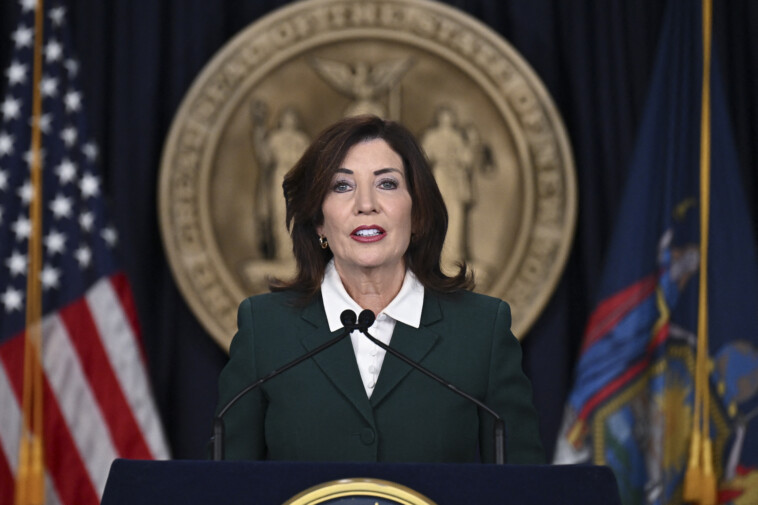Gov. Kathy Hochul pledged Friday to stop the runaway train of subway violence by making it easier to involuntarily commit and treat dangerous mentally ill New Yorkers — but critics quickly blasted her largely detail-free plan as too little, too late.
In a vaguely worded statement, Hochul said she’ll introduce legislation in New York’s upcoming budget to “finally change New York’s involuntary commitment standards.”
“Currently hospitals are able to commit individuals whose mental illness puts themselves or others at risk of serious harm, and this legislation will expand that definition to ensure more people receive the care they need,” she said.
The governor also said she would introduce a separate bill to change Kendra’s Law, “improving the process through which a court can order certain individuals to participate in Assisted Outpatient Treatment while also making it easier for individuals to voluntarily sign up for this treatment.”
The governor didn’t specify whether she’d be supporting existing bills or unveiling newly-crafted legislation. A spokesperson for Hochul said the specifics will be released when she unveils her executive budget proposal on Jan. 21.
“This has been rejected by the legislature in the past,” Hochul said in an unrelated news conference. “It is my sincere hope that everyone in the legislature is paying attention to what is unfolding in our city and in our state, and that we need to ensure that those who are suffering from severe mental illness are getting the care they need.
“I’m taking it on again. I expect to be successful.”
Hochul’s hazy plan in response to the recent wave of subway attacks — including a horrific incident in which a sleeping woman was burned to death, allegedly by an illegal immigrant, and a straphanger shoved in front of a 1 train — drew confusion, if not outright hostility.
City Councilman Robert Holden (D-Queens) ripped Hochul for failing to properly use Kendra’s Law, implying it — rather than new legislation — could help solve the problem.
For years, Holden has unsuccessfully pushed Mayor Eric Adams and his predecessor Bill de Blasio to use the law — which allows family members to petition courts to put their mentally ill loved ones into outpatient care. He has also sought, and failed, to get data on how often it is used.
“Governor Hochul is gaslighting the public by punting the mental health crisis to the State Legislature under the guise of needing changes to Kendra’s Law,” he said. “The truth is that Kendra’s Law works when properly enforced, but city and state agencies have failed to follow through, and the governor has failed to allocate the necessary resources to make it effective.”
Hochul’s announcement unfolded on the 26th anniversary of the death of Kendra Webdale, a 32-year-old writer who was killed when a schizophrenic man pushed her in front of a Manhattan train.
The shocking attack prompted lawmakers to pass Kendra’s Law, named after Webdale.
Her brother Ralph Webdale Jr. told The Post he couldn’t comment on Hochul’s proposals without knowing more details.
But he said that violent mentally ill people attacking straphangers has been an ongoing safety concern for New Yorkers – and questioned Hochul’s belated response.
“This isn’t something that’s new,” said Webdale, who previously spoke to The Post following the fatal subway shove of straphanger Michelle Go in 2022.
“You’d think leadership from years ago and that’s current would do something,” he added. “Until they start taking it more seriously from a legal or financial aspect, nothing is really going to happen.”
Brian Stettin, the mayor’s senior adviser on severe mental illness and a co-author of Kendra’s Law, said the biggest issue with the law has been getting more people into care.
Too many destitute people are in a “revolving door” mental health treatment where they get arrested or picked up after they stop taking medication or receiving treatment, Stettin said.
The Adams administration wants wants to require each person in psychiatric care to be screened before being released if they are eligible for Kendra’s Law, because many don’t get into the program because hospitals fail to refer them, he said.
“We don’t know what she is proposing today on Kendra’s Law since her statement was vague, but we hope that this is one of them,” Stettin said. “The devil is in the details and we’re anxiously awaiting to see what she proposes.”
Hochul told reporters that more needed to be done to make sure unwell people with a history of violence actually participate in their Kendra’s Law-ordered Assisted Outpatient Therapy.
“There have to be consequences to that,” she said. “We have to have more teeth in those laws.”
The governor also said her proposal will clear up ambiguities in the state’s existing involuntary commitment law — but was herself ambiguous on how exactly.
“It only talks about the situation where they’ll do harm to themselves or others,” she said about the existing law. “We are proposing other language that I’ll be introducing in two weeks.”
Adams, who launched the city’s own involuntary commitment plan more than two years ago, praised Hochul for “finally” heeding his repeated calls for state reforms for helping homeless New Yorkers with untreated severe mental illness.
“With today’s announcement, we are exceptionally grateful to Governor Hochul for listening to our calls and to the calls of everyday New Yorkers, and we look forward to working with her to develop next steps to finally codify these changes into law,” he said in a statement.
“There is no dignity in withering away on the streets without the ability to help yourself, and there is no moral superiority in just walking by those individuals and doing nothing. We must stop being so idealistic that we’re not realistic.”
Adams offered up The Supportive Interventions Act — a state Assembly bill sponsored by Edward Braunstein (D-Queens), with the mayor’s backing — as a solution.
But Hochul spokesman Avi Small told The Post that the mayor’s preferred bill won’t be the legislation that the governor will push.
While the governor’s office refused to share details of Hochul’s proposal ahead of her formal roll out, sources said that her plan may take up aspects of Braunstein’s failed bill.
The bill would give more medical professionals the ability to recommend someone to be committed involuntarily, including psychiatric nurse practitioners, psychologists and social workers.
One source suggested Hochul is supportive of only including psychiatric nurse practitioners.
The governor is also considering tweaks to the law that would allow individuals to have access to services they would receive under Kendra’s Law, without being committed under the legislation, sources said.
In her statement, Hochul also touted $1 billion in funding for mental health initiatives she and the state Legislature approved in 2023.
She also stood by her assertion that her deployment of hundreds of National Guard troops in the subway was decreasing concerns about crime underground, without providing any data or evidence.
Hochul’s approach rankled many lawmakers and advocates.
Glenn Liebman, CEO of the Mental Health Association of New York, disapproved of Hochul’s vague proposals, arguing that they’re missing the forest for the trees.
He said the response needs to be more multi-faceted to include incentives to ramp up mental health work force, critical incident review panels and funding for institutional health services.
“I don’t think tweaking exiting laws, through Kendra’s Law or other mechanisms… is not the strategy that would be most useful,” he said. “I think that these tragedies are terrible, but we need to have a strong systemic response.”
Republican City Council members laid the blame for the subway chaos on lax criminal laws and the closures of psychiatric facilities.
“This is all just more smoke and mirrors from Albany,” said Joann Ariola (R-Queens). “Getting people picked up sounds great, but they can only be held for 72 hours and then they are right back on the street wreaking havoc again. We need the state to commit to reopening psychiatric facilities so we can get these people real, long-term care, not three-day timeouts before turning them loose again.”
Councilman David Carr (R-Staten Island) said Hochul’s foot dragging came at the expense of safety in New York City.
“If people with mental issues are not following their prescribed treatment, then they are danger to themselves and others,” he said. “That is all we need to get these people off the streets and protect both them and the public. It’s absurd this hasn’t been done by now.”
Rep. Ritchie Torres (D-Bronx), who is eyeing a run for governor, railed at Hochul, accusing her of dragging her feet in addressing New York’s mental health crisis.
“In the three years since the shocking murder of Michelle Go, who was shoved in front of an incoming subway car by a schizophrenic, the Governor did nothing to protect the general public from those with severe mental illness,” he wrote on X. Governing is not about waiting years for more tragedies to happen.”
The governor’s suggestions also drew fire from Donna Lieberman, the executive director of the New York Civil Liberties Union.
She argued involuntary commitments are routinely done by police and other city officials.
“What exactly happens to these New Yorkers after they are involuntarily committed is not clear and isn’t made publicly available,” she said. “What research does make clear is that coercing people into mental health care is generally ineffective and does little to improve people’s mental health.”
“The real problem is there are not nearly enough mental health care resources available, especially for those who need them the most and including people subject to involuntary commitment.”







